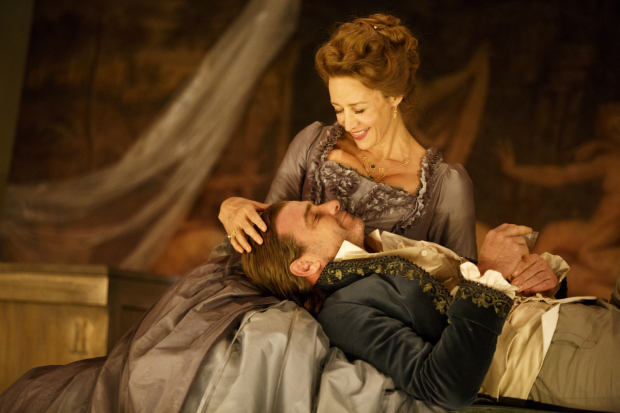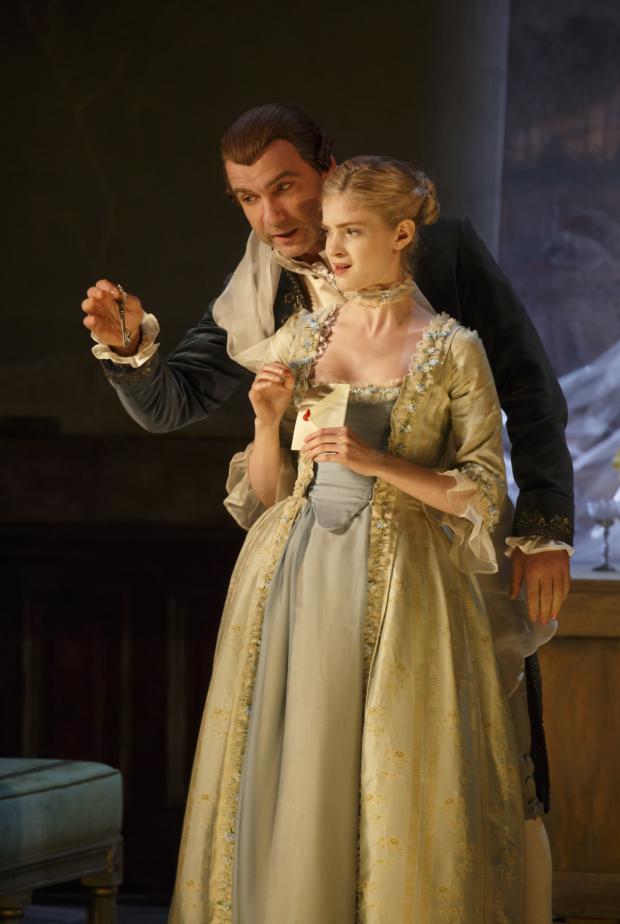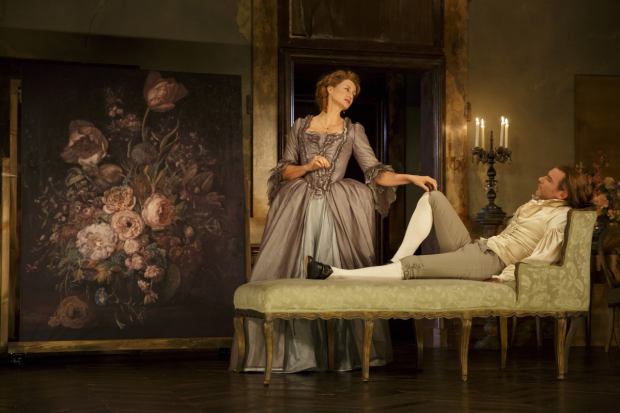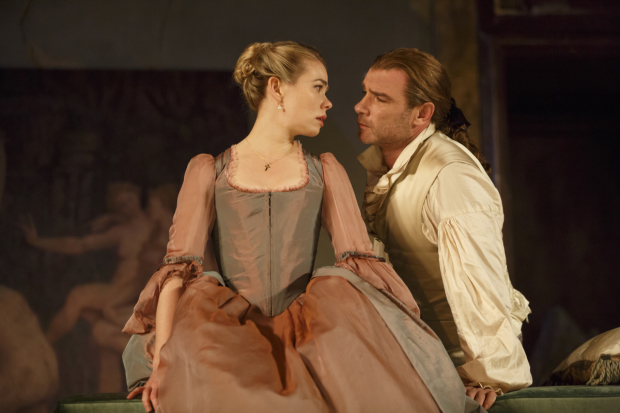Les Liaisons Dangereuses
Liev Schreiber and Janet McTeer star in the second Broadway revival of this play about rococo naughtiness.

(© Joan Marcus)
Antique furniture and giant oil paintings draped in plastic occupy the stage of the Booth Theatre, which looks like a crumbling French château undergoing a major renovation in Tom Scutt's brilliant scenic design for the Broadway revival of Christopher Hampton's Les Liaisons Dangereuses. Lighting designer Mark Henderson initially illuminates this scene with fluorescent overhead work lamps, but as the play begins, the troffers fly away to be replaced by candlelight chandeliers. Spectral actors enter singing to dramatic baroque music. Are these the ghosts of calcified wealth and power come to haunt their old turf? It's an arresting first moment of a play that is only intermittently compelling due to somewhat stiff performances.
Les Liaisons Dangereuses debuted on Broadway in 1987 and was last seen on Broadway just eight years ago, so its return seems a bit premature. With a bold design concept and acidly cynical staging, director Josie Rourke (who crafted this production in 2015 for London's Donmar Warehouse, where she is artistic director) convincingly argues that this is the perfect time for a play about the twilight gavotte of a rotten aristocracy. It leaves us wishing that the cast could keep up with the tempo.
The play is based on Pierre Choderlos de Laclos' novel of the same name. Written in the decade before the French Revolution, this yarn of sexual intrigue and cruel intentions among the aristocracy unfolds through a series of private letters allegedly leaked to the publisher. Its depiction of depravity among the idle rich undoubtedly contributed to the ancien régime's fall from grace in the French popular imagination. Hampton manages to convey this dynamic despite an overwritten script that is painfully slow to develop.

(© Joan Marcus)
In the story, the Marquise de Merteuil (Janet McTeer) wants to corrupt young Cécile Volanges (Elena Kampouris), who is just out of convent and engaged to be married to a former lover of the Marquise. She wants to humiliate her old flame with a loose wife and sees no better man for the job than another old squeeze, the licentious Vicomte de Valmont (Liev Schreiber). He finds the whole task too easy, instead setting his sights on the married and morally incorruptible Madame de Tourvel (Birgitte Hjort Sørensen, sporting a severe bun and a modest demeanor). He hopes to win her trust by saving a financial destitute family of peasants (and making sure that the news gets back to her). Merteuil promises to spend a night in bed with Valmont if he succeeds in his quest with Tourvel, provided he can obtain written proof. She tempts and deceives him all along the way, like a glittering Eve to his perfumed Adam.
The first woman to direct this play on Broadway, Rourke smartly resists the temptation to plaster over Laclos' tale with contemporary right-on feminism, as her male processors did and as the playwright practically demands. This is especially apparent during a scene in which Merteuil justifies her cruelty as the natural response to systemic misogyny: "I was born to dominate your sex," she leans in while holding out two fingers like the patron saint of girl power, "and avenge my own." Despite McTeer's pointed delivery, it isn't lost that this over-the-hill queen bee delivers the entire monologue in front of a still life of wilting flowers.

(© Joan Marcus)
Rourke's admirably unflinching resolve to preserve Laclos' cynicism is further demonstrated when the middle-aged Valmont sneaks into Cécile's chamber and engages in some nonconsensual petting of the girl, who appears to be about 12 (19-year-old Kampouris fully commits to this preteen interpretation of her character). He kisses without asking, reaching into her nightgown to grab her. Schreiber dares us to laugh with a comic delivery of this sexual assault; many in the audience gladly oblige.
Scutt's set does more contextual heavy lifting in the second act when the masterful baroque canvases disappear, replaced by lifelike (if airbrushed) ladies' portraits, signifying the complete capitulation of art to the vanity of its patrons. Naturally, Scutt's costumes are various degrees of lavish, although the straitlaced Tourvel is far more covered up than the other ladies. Composer Michael Bruce has written dramatic original string and harpsichord music for the transitions, which the ladies of the cast sing along to as they change the scene. It unfailingly injects a note of tension and urgency in the proceedings that the performances rarely sustain.
In bringing so many artfully executed ideas to the design, Rourke has unfortunately neglected some of the basics that make this drama endurable. The performances range from stilted to hypernaturalistic. No one seems to be on the same page. This especially applies to Schreiber and McTeer, whose chemistry is conspicuously absent. As a result, their scenes together tend to drag, rather than crackling with the tightly restrained sexual energy of two practiced sadists. It's more often boring than titillating.
This is a real shame considering that Schreiber and McTeer have individually devised very compelling takes on their characters: McTeer eschews the typical iciness of her character, giving us a Merteuil whose cruelty springs directly from her insecurity and emotional pain. Schreiber's Valmont is a master thespian who is so believable in his performance that he even convinces himself by the end. He and the audience truly believe that he falls for Tourvel. Granted, this clear-eyed presentation of the human tendency to craft narrative around our meaningless lives may be just one more cynical twist of the knife.

(© Joan Marcus)
Soporific turns aside, this revival production makes an airtight case that Les Liaisons Dangereuses is a play for our depraved age. Laclos and Hampton write of a world in which powerful older men make unwanted sexual advances, charity is always self-serving, and the private correspondence of the ruling class is leaked to an angry public ravenous for blood. Plus ça change.









